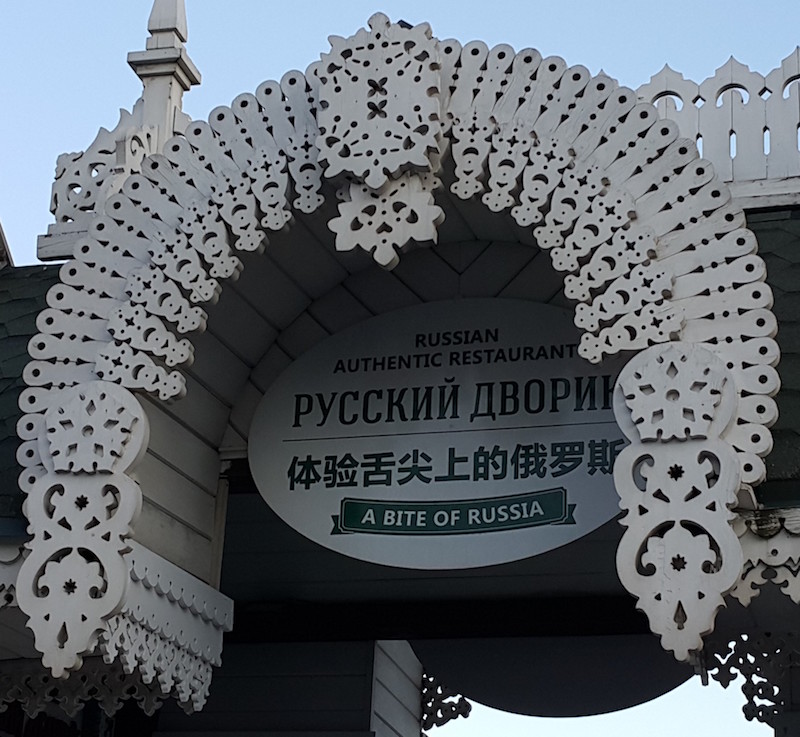A Bite of Russia
« previous post | next post »
From Nikita Kuzmin:
Nikita writes:
This evening I found the above photo in my cellphone image gallery, which you may find rather interesting. I took this picture in August during my summer visit to Sergiyev Posad, a small town in the Moscow Region. It is considered as the spiritual center of the Russian Orthodox Church, because the Trinity Lavra of St. Sergius – one of the most influential monasteries in Russia, is situated there.
Just in front of the monastery, there is a Russian-cuisine restaurant, with a puzzling inscription in English, Russian, and Chinese. First, the inscriptions in three languages do not completely correspond with each other. Actually, only the Russian – Русский дворик (Russian courtyard) stands for the restaurant’s name. Secondly, I am sure that the Chinese Phrase “体验舌尖上的俄罗斯”* originates from a famous Chinese TV program 舌尖上的中国**, which is devoted to different Chinese dishes and cuisines. Last, but not the least, the final phrase, “A bite of Russia”, reminds me of the English name of the program “A bite of China”. I was amazed how the owners of the restaurant transformed the original name of the Chinese TV program into an advertisement for their own establishment.
———
[VHM: *tǐyàn shéjiān shàng de Èluósī 体验舌尖上的俄罗斯 ("experience Russia on the tip of your tongue"); **shéjiān shàng de Zhōngguó 舌尖上的中国 ("China on the tip of your tongue") — incidentally, shéjiān 舌尖 is the Chinese equivalent of "apical"]
Next time I go to Moscow, I will definitely want to make a day trip to Sergiyev Posad to experience the cuisine at Русский дворик (Russian courtyard).

Ethan said,
September 14, 2017 @ 11:02 pm
"A Bite of X" is commonly used as a name for the food-vendor section of a festival or street fair, or the name of a food court in a public space, and so on. "X" generally refers to the geographical or ethnic source of the food, although sometimes it just refers back to the larger festival or event it is associated with. So "A Bite of Russia" would probably be a place for stalls, food-carts, or just serving sites offering various foods associated with Russia. So I would take the restaurant sign as being very colloquial English usage in the US, maybe other English-speaking areas as well.
Keith said,
September 15, 2017 @ 1:20 am
I would imagine that the place serves закуски, pl. of закуска, usually translated into English as "a bite, a snack, a nibble".
David Marjanović said,
September 15, 2017 @ 5:54 am
Isn't China the place where Coca Cola means "(you can) taste and enjoy"?
ajay said,
September 15, 2017 @ 8:40 am
On your hurricane-naming post below, by the way, a study last year found that female hurricanes cause significantly more casualties than male ones, despite not being significantly different in size, wind speed etc. The researchers hypothesised that female names just sound less scary and therefore discourage people from evacuating.
MattF said,
September 15, 2017 @ 8:45 am
"Taste of… [someplace]" is probably the more common English name for that sort of eatery.
D.O. said,
September 15, 2017 @ 9:59 pm
ajay, that study was roundly debunked.
Andy Averill said,
September 16, 2017 @ 5:22 pm
A Bite of China can be streamed for free on Amazon if you have Prime, and it is by far the most astonishing food documentary I've ever seen. They went to every corner of China and captured authentic methods of food sourcing and preparations. If you want to see how lotus roots are harvested (think mud), this is the show for you. Added bonus for LL readers: the audio is in Chinese, with English titles, so you can look for bloopers.
BZ said,
September 18, 2017 @ 2:43 pm
Maybe "A Bite of Russia" is the English name for the restaurant. What is puzzling is that this name, as well as "Russian Authentic Restaurant" (where I really want to swap the first two words, by the way) appears in Russia. Wouldn't one expect authentic Russian food in a restaurant in Russia?